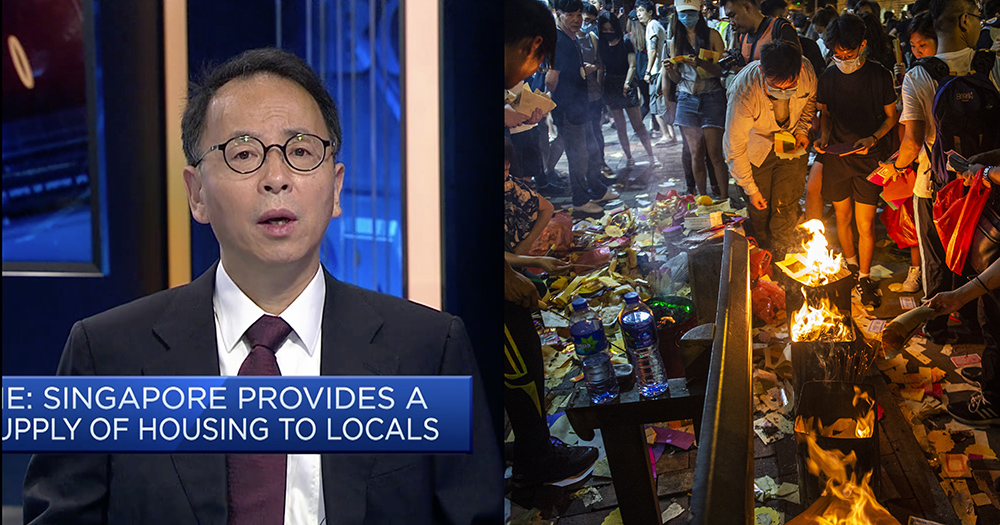Shanghai-based economist Andy Xie has labelled Hong Kong's billionaires as "the problem" that underlies the current protests.
Speaking to CNBC on Aug. 14, Xie said it is the property tycoons that are at fault, and not really the Hong Kong government in charge of the city.
The implication is that each time a disturbance occurred in the city, Beijing consulted the tycoons for advice.
Xie said: "Something's very wrong, these guys (the tycoons) are causing the trouble in Hong Kong. Why are you going to them for advice every time?"
"You hear that Beijing is pressuring these guys to solve Hong Kong's problems again. They are the problem and they need to become regular business people, not having political power (and) running the place."
The tycoons "control" Hong Kong's land and political structure
Xie claimed that Hong Kong's land and political structure were both under the control of the property tycoons.
Holding enough land to solve Hong Kong's housing shortage
Xie then drew a comparison with Singapore's land situation.
He said: "The government is not in charge. It's very different from Singapore. In Singapore, the government is in charge and the land is under the government's control. In Hong Kong, it is not."
He added that this meant Hong Kong city's top four property developers had enough land to build about 400,000 flats and potentially solve Hong Kong's housing shortage.
But Xie added that the developers did not do that as they wanted to "milk that (the land), so the price stays high for a long time and they profit from that".
Additionally, real estate developers have set housing prices against the salaries and bonuses of the financial sector, which has priced out the majority of the local population.
Political structure largely for business interests
Xie also highlighted the difference in Hong Kong's political structure from both Singapore and Taiwan.
He said: "The key is that the political structure here is neither the Singapore situation where the government is on top, nor like Taiwan (where) it’s a democracy and people can vote."
"So (Hong Kong is) in between, it's just a bunch of business people calling the shots."
Xie concluded that what needed to be done was for the tycoons to become "regular business people", without political power and control of the city.
Sentiments echoed by others
Xie's sentiments were echoed by the chairman of Lan Kwai Fong Group, Allan Zeman.
According to Bloomberg, Zeman said that urgent measures were needed to address the city's housing crisis.
He said: "A lot of these people, I don’t blame them for marching because they don’t have hope. They live with their parents, they don’t see a future for themselves."
Petition by billionaires calling for protests to stop
Xie's remarks comes in the wake of a joint petition issued by Hong Kong's property tycoons on Aug. 11.
It called on the public to halt all illegal protests and acts of violence so as to allow Hong Kong to stabilise, South China Morning Post reported.
The petition was signed by:
- Peter Woo Kwong-Chin of Wheelock and Wharf Holdings,
- Victor Li Tzar-kuoi of CK Hutchison,
- Peter Lee Ka-kit of Henderson Land Development,
- Raymond Kwok Ping-luen of Sun Hung Kai Properties, and
- Henry Cheng Kar-shun of New World Development.
The petition in turn followed an earlier statement on Aug. 8, by the Real Estate Developers Association of Hong Kong, which said that the protests had deviated from its original intention after escalating violence.
Billionaire loses over US$1 billion as a result of protests
Bloomberg highlighted that Woo had seen more than US$1 billion wiped from his personal wealth as a result of the unrest amid the Hong Kong stock market.
Woo subsequently penned a statement on Aug. 12, and said that the protests had already achieved its aim of stopping the extradition bill.
The statement said: "It’s time to think deeply. Going against the extradition bill was the ‘big tree’ of this movement. This one and only big appeal has already been accepted by the government, so this tree has fallen."
He added that the protests had since become an opportunity for some people to "purposely stir up trouble".
Woo also singled out acts of violence by the protesters, but not the actions of the police, whom he said were "outnumbered".
He further praised Hong Kong Chief Executive Carrie Lam as a "100 percent Hong Kong daughter" who had done much for the city.
He said: "She hasn’t betrayed Hong Kong. She already accepted public demands and pronounced the bill dead."
Left image screenshot from CNBC, right photo by Vernon Yuen/ NurPhoto via Getty Images
If you like what you read, follow us on Facebook, Instagram, Twitter and Telegram to get the latest updates.
